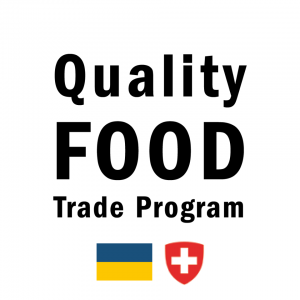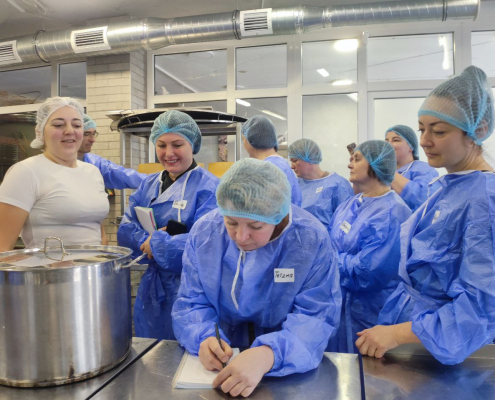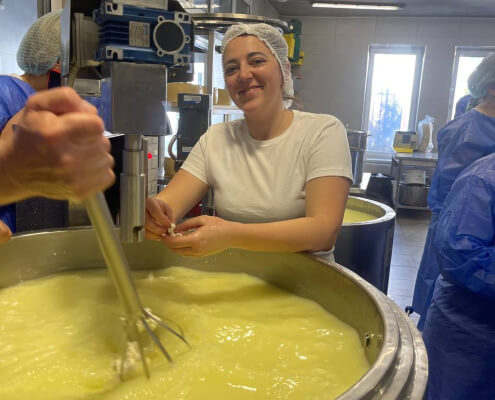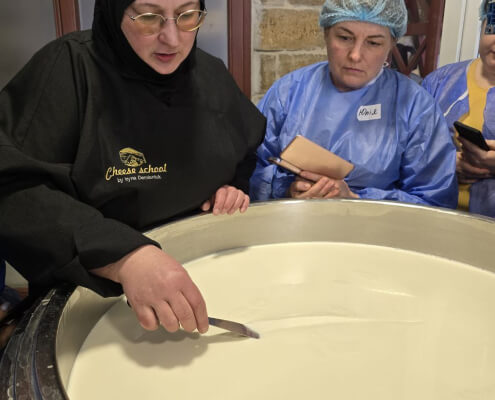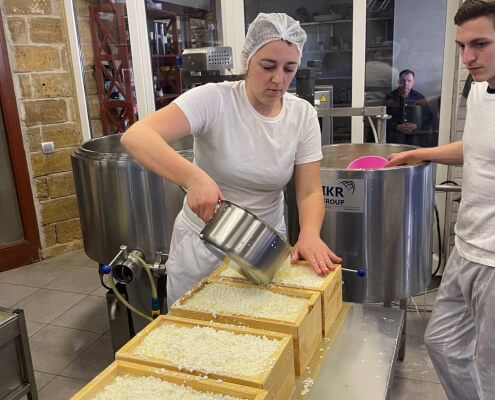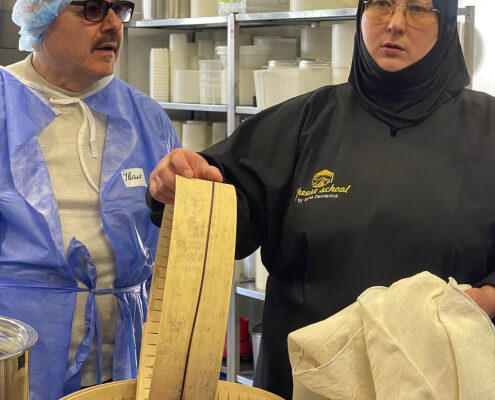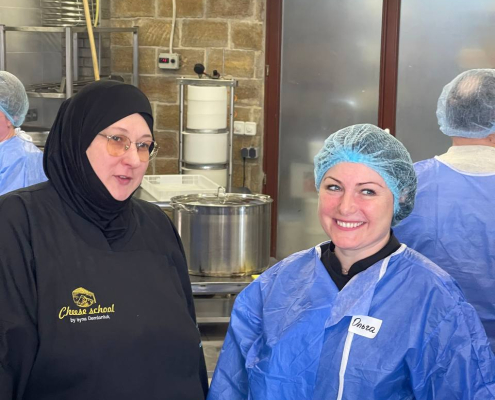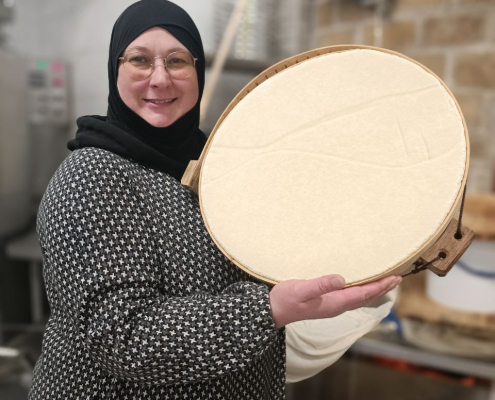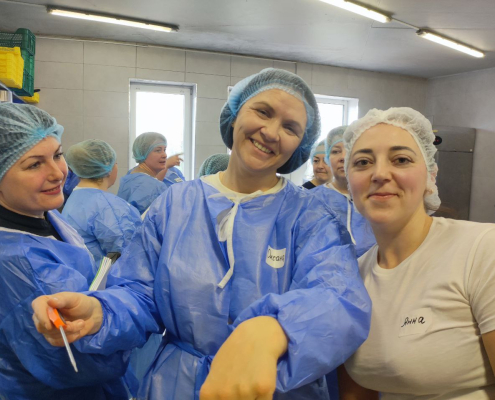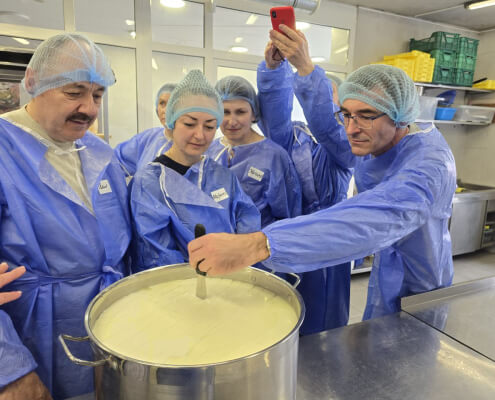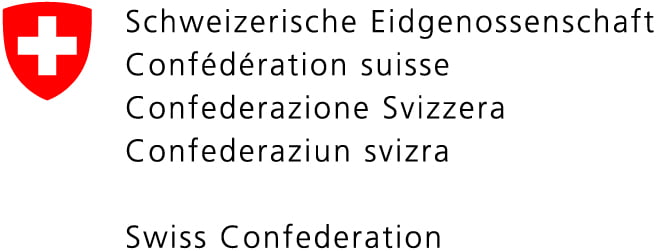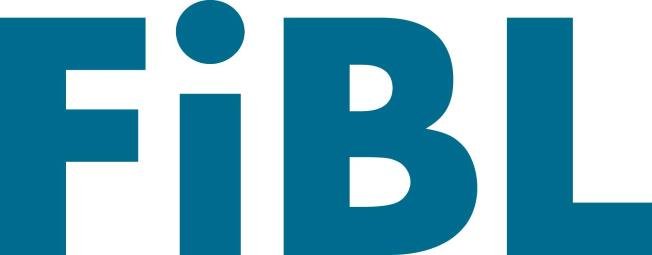Results of the “Veterans Cheese” course: cheese-making training for veterans, their wives and internally displaced persons
With the support of Switzerland, the Veterans Cheese training course was held, aimed at the social adaptation of veterans, their wives, and internally displaced persons through mastering of the craft cheese making.
The educational program was designed with a focus on developing new professional skills, supporting entrepreneurial initiatives and restoring psycho-emotional well-being.
The course was successfully completed by 76 participants, of whom 20 were invited to the practical part, which involved making cheese at the Iryna Demianiuk Cheese Making School and Cheese Way.
“Cheesemaking is not just a craft, but a meditative and creative process that promotes focus, reduces anxiety levels, and brings satisfaction through manual work. Learning this process helped course participants shift from stressful thoughts to creative activity, unlock their potential, and rebuild their sense of self-worth,” said the course initiator Iryna Demianiuk, a professional cheesemaker and founder of a cheesemaking school.
During the theoretical part of the course, participants learned about the technological processes of cheese production, financial and accounting aspects, work organization and regulatory standards, marketing and sales, and also received motivation and emotional support.
In the practical sessions, they became familiar with all stages of production — from milk reception and raw material quality assessment to packaging of the final product. Participants also took part in a guided cheese tasting, evaluating product quality and identifying potential defects.
The course aimed to:
— develop the craft cheesemaking in Ukraine,
— promote local farm and artisan products,
— create new jobs and self-employment opportunities,
— support small businesses in Ukraine.
“This training is another step in promoting cheesemaking in Ukraine. For over five years, the QFTP programmehas been supporting the transformation of the dairy sector through the introduction of innovations, improvement of product quality, and creation of higher value-added products. The successful implementation of the Veterans Cheese course demonstrated both the strong demand for and the great potential of such initiatives,” added Iryna Vysotska, Deputy Local Manager and Coordinator of the Dairy Sector Component of the Swiss-Ukrainian Programme “Higher Value Added Trade from the Organic and Dairy Sectors in Ukraine” (QFTP).
Below are some testimonials from course participants.
Natalia Novobranets lives in Chornobaivka, Kherson region. Her passion for cheesemaking began with a single goat she bought to provide fresh dairy products for her grandson. Over time, the hobby turned into a real passion: in Kryvyi Rih, her husband bought two more Saanen goats. During the occupation of Chornobaivka, one of them was killed by cluster shrapnel during a shelling, but her kids survived.
“When my husband was in captivity, he sent a note asking to save the goats,” Natalia recalls. After his release, at her request, he brought goat kids from different regions of Ukraine: Alpines from Kirovohrad region, Nubians from Mykolaiv region, Lamanchas from Donetsk region, and Murcianas from Komyshuvakha, Zaporizhzhia region.
“It’s something for the soul — like antidepressants. For my husband, it’s a kind of therapy after captivity. I started to experiment with making things from milk. I was really happy to be accepted into the cheesemaking course. It will be a valuable experience. I hope that over time this hobby will grow into something more,” she shares.
Polina Zhovtiak is the wife of a volunteer soldier and mother of three. Before February 24, 2022, she and her husband were developing a family farm and cheesemaking business. When her husband and eldest daughter went to defend Ukraine, all the responsibility fell on her shoulders: the household, children, bakery, small shop, a farm with cows, goats, sheep, poultry — and, of course, cheesemaking.
“The farm became my pillar of strength. Thanks to daily work, caring for the animals, and making cheese, I was able to endure, stay strong, and keep going. It helped me survive these terrible years of war, when my heart clenched every day with worry for my loved ones,” Polina shares.
She began her cheesemaking journey as her husband’s assistant, but over time mastered the entire process: learning how to make cheese, sense the milk, and understand the technology. And she hasn’t stopped — she continues learning, experimenting, and seeking her own signature flavors.
Her dream is to learn how to make authentic cheddar from Iryna Demianiuk, because, as Polina says, “her cheese is the tastiest we’ve ever tried in Ukraine.”
Iryna Vasiuta from Dnipro discovered cheesemaking during the COVID-19 lockdown, when her family business had to temporarily shut down. She started making her first cheeses at home — for herself and her loved ones. After the lockdown, she returned to work, but the thought of cheese never left her. Iryna began searching for learning opportunities, taking courses, and gaining experience.
On February 24, 2022, her life changed dramatically — her husband and eldest son went to the front. In the most difficult days, cheesemaking became her source of support — an inner anchor, a way to preserve herself. In June 2022, Iryna lost her husband.
“There was a time when I couldn’t do anything. But eventually, I returned to cheesemaking. It became my path back to myself, to creativity, to life. And even a source of income,” she shares.
She is incredibly grateful to have taken part in the cheesemaking course. She says she wants to deepen her understanding of the processes, refine her skills, and be among people who also believe that cheesemaking can heal and restore strength.
Halyna Chebotar lives in a small village in the Vinnytsia region. She began her journey into cheesemaking just a few months ago. Learning independently, she searches for information online, purchases courses, studies, and experiments with practical skills.
For Halyna, cheesemaking has become a form of therapy — a source of support during a difficult time, a way not only to survive but also to raise her three children. Her youngest daughter is just over a year old.
“My husband has been missing for a year and a half. It’s not easy being on my own, but I try to stay strong, keep learning, and not give up. The cheese I make is bought by my friends — it’s their way of supporting our family, both financially and emotionally. They don’t let me lose hope,” Halyna shares.
She is deeply grateful to Iryna Demianiuk and all the course lecturers for the opportunity to learn. She especially values the recorded sessions — since she can’t always attend live, she watches them late at night, when everyone is asleep.
Yulia Sereda from Dnipro had her first experience with cheesemaking 20 years ago. Back then, when cheese was scarcely available in stores, homemade cheese was a real treasure.
Yulia was drawn back to cheesemaking by grief: in November 2023, she lost her son, a defender of Ukraine. His heart stopped due to injuries incompatible with life. In search of support and a renewed sense of purpose, she began working with psychologists and support groups — and it was during that time that she remembered cheese.
“It was important for me to find something that could help me refocus, but also maintain a connection with my son. He loved cheese. I couldn’t fulfill his dream of starting his own business, but cheesemaking became my way of honoring his memory and pouring my love into something meaningful,” Yulia shares.
Today, she makes cheese at home, buying milk at the local market. She already has her first sales, some orders, and most importantly — the inspiration to keep going.
“I really appreciate that the course not only helps improve cheesemaking skills but also teaches how to sell your products. I have high hopes for this course. I’m sincerely grateful to Ms. Iryna for the opportunity to be part of it,” says Yulia.
This course was supported by Switzerland within the framework of the Swiss-Ukrainian Programme “Higher Value Added Trade from the Organic and Dairy Sectors in Ukraine” (QFTP) implemented by the Research Institute of Organic Agriculture (FiBL, Switzerland) in partnership with SAFOSO AG (Switzerland), www.qftp.org.
